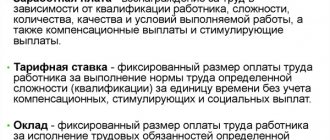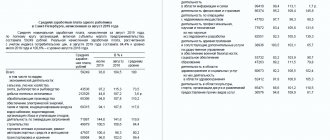How will an increase in the minimum wage affect the salaries of public sector employees? This is a very pressing issue that worries both public sector employees themselves (after all, for many this will mean an increase in wages), and for personnel officers and managers, since they have to carry out a number of important procedures and at the same time comply with the law, which is traditionally strict with everything that concerns employee-employer relations.
Why has the question of how an increase in the minimum wage will affect the salaries of public sector employees become so relevant recently? The fact is that as of May 1, the latest changes to Federal Law No. 82-FZ “On the minimum wage” come into force. For the first time since the entry into force of the Labor Code of the Russian Federation, the provisions of its 133rd article will be implemented, namely: the amount of the minimum wage will be equal to the subsistence level.
The cost of living is not a constant value, so the government chose the level of the cost of living for the 2nd quarter of 2020 as the starting point. It is established by Decree of the Government of the Russian Federation No. 1490 and is equal to 11,160 rubles. Based on this, the minimum earnings from May 1, 2020 cannot be set lower than 11,163 rubles. How will an increase in the minimum wage affect the salaries of public sector employees? The answer is obvious: the employer will not be able to set a lower wage rate. However, in practice, nuances may arise; these will be discussed below.
Regional minimum wages
First of all, we must take into account that, in accordance with Art. 133.1 of the Labor Code of the Russian Federation, regional authorities can also set the minimum wage for a specific subject of the Russian Federation. This is important to take into account when searching for an answer to the question of how an increase in the minimum wage will affect the salaries of public sector employees in the regions. There are two rules here:
- Wages in the region cannot be lower than the amount established at the federal level, thus, all local regulations that contradict the new amendments must be revised, otherwise their application will be contrary to the law. This happens because the priority of federal legislation over regional legislation is enshrined in the Constitution of the country.
- If the regional minimum wage is set higher than the federal one, enterprises must either set wages in accordance with the regional minimum wage, or justify to the local authorities their inability to raise the salaries of their employees to the regional level.
Most common mistakes
Error No. 1. It is believed that the staffing form approved in the T-3 form is mandatory. However, it is not. An enterprise can develop its own document form.
Mistake No. 2. The question of whether it is necessary to notify an employee 2 months in advance about a pay increase is controversial. According to Art. 74 of the Labor Code of the Russian Federation is considered necessary. However, practice shows that the absence of such notification is not a violation, since it does not infringe on the rights of employees.
Mistake No. 3. If there are regional laws on minimum wages, then the employer must adhere to these instructions. In the absence of such regional documents, the federal minimum wage is applied. Also, if there is an industry minimum wage, you need to focus on it.
What should an employer and a personnel officer do?
How does the minimum wage affect the salaries of public sector employees? The answer to the question follows from the regulatory act and the general norms of the current legislation in the Russian Federation: rates that do not meet the specified requirements must be increased. Consequently, the manager and HR employees should review all employment contracts and increase rates for those employees whose earnings are below the legal minimum.
What needs to be done urgently:
- Amend the Regulations on Remuneration.
- Prepare an Order to increase wages and familiarize all employees with it, subject to signature.
- Make changes to the staffing table.
- Prepare additional agreements to employment contracts, which indicate the new salary amount.
How to issue an order to establish an additional payment
Let's look at an example that explains how to issue an order for an additional payment up to the minimum wage and how to pay the additional amount correctly.
Kvanta LLC has 5 employees. Everyone works under employment contracts on a full-time basis. Employment contracts with managers establish a fixed salary and define the condition for receiving monthly bonuses: their percentage depends on the number of new contracts concluded with potential buyers during the month.
When calculating salaries, the company draws up a calculation table. Below is a table for January 2020:
In order not to waste extra time on additional calculations and their execution, the chief accountant put the necessary data and formulas into an Excel table and enters monthly only the bonus amounts (the variable part of the salary). To compare the accrued salary with the minimum wage and calculate the additional payment, a separate column 6 is provided. It shows that two employees need to be paid additionally (R.G. Perov and A.N. Surin). The calculation takes into account the current minimum wage in January 2020, equal to 12,130 rubles.
A sample order for additional payment up to the minimum wage can be downloaded here.
Is it possible to pay a salary below the minimum wage?
It should be noted that Article 133 of the Labor Code establishes the obligation to pay such remuneration when the employee fulfills working time standards and performs his duties in full, that is, labor standards. Consequently, we can see two cases when it is possible to set a rate lower than the minimum wage established in the regulatory act:
- part-time mode;
- part-time job
It is also necessary to take into account that the salary may be below this level, because according to Art. 129 of the Labor Code of the Russian Federation, wages consist not only of salary: it can include various compensation payments and allowances. The main thing is that, taking into account all incentive payments and allowances that are permanent, the employee receives an amount that is equal to or higher than 11,163 rubles.
Key reasons for increasing wages
The current law establishes that an employee's salary must represent a fixed amount, and its amount cannot be less than a certain minimum wage (subject to the development of working hours).
Therefore, if the Government decides to increase this indicator, the administration is obliged to adjust the salaries of its employees so that they are no less than the new minimum wage.
Labor law, as well as internal regulatory documents of the company, can determine the annual indexation of employee salaries. It should be carried out at an amount no less than the accepted level of price growth for the previous year.
In this case, the basis for indexation will be Art. 134 of the Labor Code, as well as the clause of the Regulations on payment, or a separate Regulation on indexation.
Attention! If an employee shows excellent performance in his work, his immediate supervisor can issue a memo to the company administration with a request to increase his salary.
The director reviews it and puts his resolution on the document. If the decision is positive, this note will serve as the basis for issuing an order.
This parameter grows every year. The growth trend is directly related to the lack of understanding by many workers of the possibility of reducing wages.
The salary amount must be indicated in the employment contract of each specialist. Based on Article 57 of the Labor Code of the Russian Federation, after signing by the parties, this indicator becomes fixed.
If the hired specialist fulfills his official duties and fulfills the requirements of the law regarding the implementation of the temporary indicator of the duration of the working day, the amount is paid on officially agreed days.
Article 57 of the Labor Code of the Russian Federation obliges to indicate in the employment agreement a strictly fixed amount of earnings in rubles and, if necessary, kopecks. This parameter must be equal to or exceed the minimum wage. Changes in the amount of earnings that are not related to this figure can be made based on:
- Increasing the salaries of employees of the structure while increasing the overall level of the organization’s financial position.
- An increase in the amount of earnings for a specific specialist due to high personal performance indicators.
- A reduction in the amount of financial incentives caused by changes in the staffing structure of the organization or a change in the principles of production organization.
Any adjustments to the salary level for an individual employee or all staff units, downward or upward, are based on uniform legislative grounds.
Firstly, they are based on the requirements of Article 72 of the Labor Code of the Russian Federation, which specifies only two grounds under consideration:
- In case of changes in technology or production structure.
- When such an adjustment is based on a bilateral agreement.
Additionally, all such changes are subject to internal agreements between all parties to the production process. They can be accepted to make changes to payments only with the consent of both parties to the production interaction.
Responsibility
What risks does an employer face if he fails to comply with the provisions of the law? Such actions form an administrative offense under Art. 5.27 of the Code of Administrative Offenses of the Russian Federation and imply the possibility of imposing a fine if a violation of labor legislation is proven. The fines are as follows:
- for a legal entity - from 30,000 rubles. up to 50,000 rub. for the first violation, for a repeated violation - from 50,000 rubles. up to 70,000 rub.
- for an official guilty of a violation - from 1000 rubles. up to 5,000 rubles, in case of repeated violation - from 10,000 rubles. up to 20,000 rub.
We hope that the reader received a detailed answer to the question of how the salary of public sector employees depends on the minimum wage and how the salary should be increased if before May 1 it was below 11,163 rubles.
The requirements of the law apply not only to the budgetary sphere - commercial organizations must also comply with the requirements of the federal law “On the Minimum Wage.”
The procedure for making adjustments to the staffing table
The adjustment algorithm looks like this:
- execution of an order from the company management, which indicates a link to change the salary amount. It is possible to issue not several separate orders for each position, but one single document (general) on changes to the schedule;
- the issued order is brought to the attention of employees affected by such changes in writing;
- the personnel officer prepares a new sample staffing table or an addition to it in the form of a separate sheet;
- the finished document is approved by management and comes into force.
Registration is possible according to two options presented in the table below.
| Option | Which companies benefit from this option? | Characteristic |
| Appendix to the main document | For big ones | An application to the staffing table is being created |
| New document with serial number | For small ones | A completely new document is created and a new number is assigned to it. |
In what situations may you need an order to increase your salary (sample 2020)
The Labor Code of the Russian Federation provides all workers with a guarantee in the form of wages at a level not lower than the minimum wage, without taking into account regional allowances and coefficients.
This means that employers must monitor the innovations that the authorities approve in this area and raise salaries for their employees if the amounts currently paid are below federal standards. According to current legislation, the minimum wage is established annually from January 1. It can either increase or remain at the same level, depending on what level of the living wage for the working-age population was approved by officials for the 2nd quarter of the previous year. Therefore, an order to increase salary in connection with an increase in the minimum wage will be needed at least once a year.
Let us remind you that the last time the requirement to increase the minimum wage came into force was 01/01/2019. From this date, persons who have entered into full-time employment contracts and worked a full month must receive at least 11,280 rubles. This is a federal figure, and in the regions it may be higher. But it does not include income tax, as well as allowances for labor in certain areas. This means that a person can receive either less (minus personal income tax) or more (plus regional allowances).
If your company’s salaries are below 11,280 rubles, you definitely need to reconsider them. Our sample order to increase salaries for all employees will help you do this correctly. The same template can be used if the level of wages was increased not for all employees, but only for some. For example, for high productivity or extensive work experience.
Another case when an example of an order will be in demand is the annual indexation provided for in Art. 134 Labor Code of the Russian Federation.
Let us remind you that for refusal to increase wages taking into account the new minimum wage, fines of up to 50,000 rubles are provided. However, the punishment may be more severe if employees complain about the delay or incomplete payment of amounts due to them - up to 100,000 rubles, in accordance with Art. 5.27 Code of Administrative Offenses of the Russian Federation.









